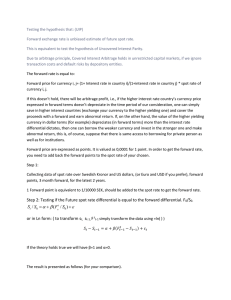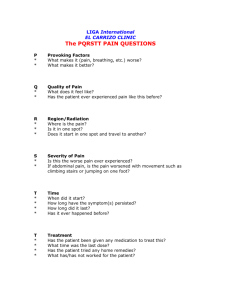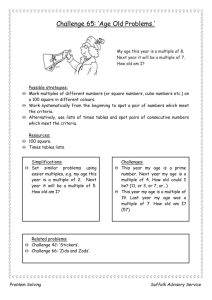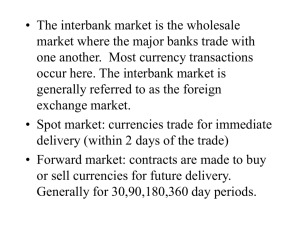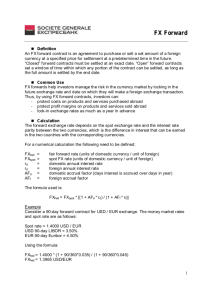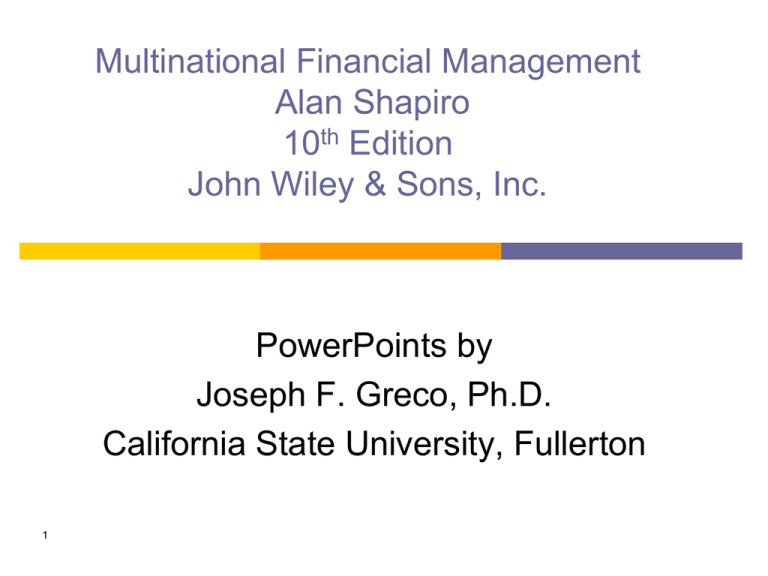
Multinational Financial Management
Alan Shapiro
10th Edition
John Wiley & Sons, Inc.
PowerPoints by
Joseph F. Greco, Ph.D.
California State University, Fullerton
1
CHAPTER 7
The Foreign Exchange
Market
2
INTRODUCTION
I. INTRODUCTION
A. The Currency Market Definition:
a place where money denominated in one
currency is bought and sold with money
denominated i.n another currency
3
3
INTRODUCTION
B. International Trade and Capital
Transactions:
facilitated with the ability to transfer purchasing
power between countries
4
4
INTRODUCTION
C. Location
1.
OTC-type: no specific
location
2.
Most trades by phone,
telex, or SWIFT
SWIFT: Society for Worldwide Interbank Financial
Telecommunications
5
5
ORGANIZATION OF THE
FOREIGN EXCHANGE MARKET
I.
6
PARTICIPANTS IN THE FOREIGN EXCHANGE
MARKET
A.
Participants at 2 Levels
1. Wholesale Level (95%)
- major banks
2. Retail Level
- business customers
6
ORGANIZATION OF THE
FOREIGN EXCHANGE MARKET
B.
Two Types of Currency Markets
1.
Spot Market:
- immediate transaction
- recorded by 2nd business day
7
7
ORGANIZATION OF THE
FOREIGN EXCHANGE MARKET
2.
Forward Market:
- transactions take place at a
specified future date
8
8
ORGANIZATION OF THE
FOREIGN EXCHANGE MARKET
C. Participants by Market
1.
9
Spot Market:
a. commercial banks
b. brokers
c. customers of commercial and central
banks
9
ORGANIZATION OF THE
FOREIGN EXCHANGE MARKET
2.
Forward Market
a. arbitrageurs
b. traders
c. hedgers
d. speculators
10
10
ORGANIZATION OF THE
FOREIGN EXCHANGE MARKET
II.
CLEARING SYSTEMS
A. Clearing House Interbank Payments System
(CHIPS)
used in U.S. for electronic fund transfers.
11
11
ORGANIZATION OF THE
FOREIGN EXCHANGE MARKET
B.
FedWire
- operated by the Fed
- used for domestic transfers
12
12
ORGANIZATION OF THE
FOREIGN EXCHANGE MARKET
III.
ELECTRONIC TRADING
A.
Automated Trading
- genuine screen-based market
13
13
ORGANIZATION OF THE
FOREIGN EXCHANGE MARKET
B.
Results:
1. Reduces cost of trading
2. Threatens traders’ oligopoly of information
3. Provides liquidity
14
14
ORGANIZATION OF THE
FOREIGN EXCHANGE MARKET
IV.
SIZE OF THE CURRENCY MARKET
A. Largest financial market in the world
2010: US$4 trillion daily
or
US$960 trillion a year
15
15
ORGANIZATION OF THE
FOREIGN EXCHANGE MARKET
B. Market Centers by Size (2010):
-daily turnover:
#1: London = $1.854 trillion
#2: New York= $904 billion
#3: Tokyo = $312 billion
16
16
THE SPOT MARKET
I.
SPOT QUOTATIONS
A. Sources
1. All major newspapers
2. Major currencies have four different quotes:
a.
spot price
b.
30-day
c.
90-day
d.
180-day
17
17
THE SPOT MARKET
B.
Method of Quotation
1.
For inter-bank dollar trades:
a. American terms
example: $1.21/€
b. European terms
example: Peso1.713/$
18
18
THE SPOT MARKET
2. For non-bank customers:
Direct quote gives the home currency price
(always in the numerator) of one unit of foreign
currency.
EXAMPLE:
$1.81/£
Since this is a direct quote, we know that in the U.S.,
one pound transacted at $1.81
19
19
THE SPOT MARKET
C. Transactions Costs
1. Bid-Ask Spread
used to calculate the fee charged by the bank
Bid = the price at which the bank is willing to buy
Ask = the price it will sell the currency
20
20
THE SPOT MARKET
Percent Spread Formula (PS):
Ask Bid
PS
x100
Ask
21
21
THE SPOT MARKET
D. Cross Rates
1. The exchange rate between 2 non - US$
currencies
22
22
THE SPOT MARKET
D. Cross Rates (con’t)
2. Calculating Cross Rates
Example:
Suppose you want to calculate the £/€ cross
rate.
You know £.5556/US$ and €.8334/US$
then
£/ € = £.5556/US$ €.8334/US$
= £.6667/ €
23
23
THE SPOT MARKET
E.
24
Currency Arbitrage
1.
If cross rates differ from one financial
center to another, and profit
opportunities exist.
2.
Buy cheap in one int’l market, sell at a
higher price in another
3.
The Critical Role of Available
Information
24
THE SPOT MARKET
F.
25
Settlement Date Value Date:
1.
Date monies are due
2.
2nd Working day after date of original
transaction.
25
THE SPOT MARKET
G.
Exchange Risk
1. Bankers = middlemen
a.
b.
26
Incurring risk of adverse exchange rate
moves.
Increased uncertainty about future
exchange rate requires:
1.)
Demand for higher risk premium
2.)
Bankers widen bid-ask spread
26
MECHANICS OF SPOT
TRANSACTIONS
H.
SPOT TRANSACTIONS:
Example:
Step 1. Currency transaction:
verbal agreement, U.S. importer
specifies:
a. Account to debit (his acct)
b. Account to credit (exporter)
27
27
MECHANICS OF SPOT
TRANSACTIONS
Step 2.
Bank sends importer
contract note including:
- amount of foreign currency
- agreed exchange rate
- confirmation of Step 1.
28
28
MECHANICS OF SPOT
TRANSACTIONS
Step 3.
Settlement
Correspondent bank in Hong
Kong transfers HK$ from
nostro account to exporter’s.
Value Date:
U.S. bank debits importer’s account.
29
29
THE FORWARD MARKET
I.
INTRODUCTION
A.
3 Part Definition of a Forward Contract:
an agreement between a bank and a
customer to deliver three things:
a specified amount of currency against
another currency
at a specified future date and
at a fixed exchange rate
30
30
THE FORWARD MARKET
B. Purpose of a Forward:
Hedging
the act of reducing exchange rate risk
31
31
THE FORWARD MARKET
C.
Forward Rate Quotations
1.
32
Two Methods:
a. Outright Rate: quoted to
commercial customers
b. Swap Rate: quoted in the
inter-bank market as a
discount or premium
32
THE FORWARD MARKET
CALCULATING THE FORWARD PREMIUM OR
DISCOUNT
= F-S x 12 x 100
S
n
where
33
F=
S=
n=
the forward rate of exchange
the spot rate of exchange
the number of months in the
forward contract
33
Copyright 2014
John Wiley & Sons, Inc.
All rights reserved. Reproduction or translation of this work
beyond that permitted in section 117 of the 1976 United
States Copyright Act without express permission of the
copyright owner is unlawful.
Request for further
information should be addressed to the Permissions
Department, John Wiley & Sons, Inc. The purchaser may
back-up copies for his/her own use only and not for
distribution or resale.
The Publisher assumes no
responsibility for errors, omissions, or damages caused by
the use of these programs or from the use of the
information herein.

